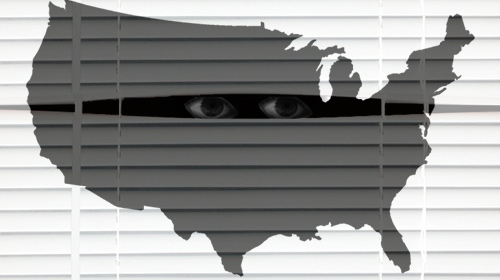
This week the └¤░─├┼┐¬Ż▒Żß╣ű published a damning report chronicling the many ways the FBI has abused post-9/11 authorities to spy on everyday Americans. As we noted, the FBI is even enmeshed in the broad suspicionless NSA dragnet of American phone calls.
One area that is especially ripe for FBI reform is its use of electronic surveillance tools. There's no two ways about it: the FBI is at the heart of the U.S. intelligence community's domestic data collection programs.
The most recent example is that the FBI applies for secret court orders to compel companies to give the U.S. military's spy agency the NSA all of their customers' domestic phone records. This means the FBI helps the military, which is traditionally barred from collecting information about Americans, to get all the telephone records of almost everyone in the U.S., even if they aren't suspected of being a terrorist or a spy or in contact with someone who is. While the NSA is the recipient and processor of our information, the FBI is the entity that makes the applications to the secret court for these sweeping orders. It also gets access to the records the NSA analyzes.
But the bureau isn't just the middleman in the NSA's spying operation here at home; it is a vast, powerful, and secret electronic surveillance agency in its own right.
Even before the NSA spying scandal broke, the FBI was caught issuing up to 40,000 or 50,000 national security letters every year to collect the communication, financial, and credit records of people without any nexus to terrorism. In 2007, 2008, and 2010, Department of Justice Inspector General reports found extensive abuse of this authority, shoddy record keeping, and concocted emergencies. In at least two instances, the FBI issued NSLs to obtain information that even the FISA Court deemed to be a bridge too far and an infringement of First Amendment rights. Despite voting on the Patriot Act several times in the last several years, Congress has never amended this authority to return it to its original purpose ÔÇô the collection of information pertaining to suspected terrorists and spies.
The executive branch could not be clearer. It will continue these programs until Congress amends the authorizing statutes and puts an end to this over collection of American information. Remember, in July, an amendment proposed by Rep. Justin Amash (R-Mich.) to defund bulk domestic surveillance under the Patriot Act was only 7 votes away from passing in the House. The momentum hasn't diminished. It fact it's only grown stronger as more and more disclosures have occurred, resulting in 20-plus bills that would provide greater transparency into government spying and more privacy protections for Americans.
Fear of overzealous government surveillance is no longer a peripheral debate, it has gone mainstream. And the heavyweights on the Hill have taken note. Rep. Darrell Issa (R-Calif.), the powerful chairman of the House Oversight Committee, has changed his mind in light of recent revelations and . Chairman Bob Goodlatte (R-Va.) of the Judiciary Committee says for the NSA. Even the author of the Patriot Act, Rep. Jim Sensenbrenner (R-Wis.), says . During a committee hearing earlier this summer, Sensenbrenner told the government it had better , otherwise ""You're going to lose it entirely."
Before the Patriot Act, the government's surveillance tools were designed to collect information on specific individuals suspected of being foreign agents and terrorists, not engage in dragnet surveillance methods that ensnare innocent people. Congress should return the government to that standard.
Learn more about the FBI and other civil liberty issues: Sign up for breaking news alerts, , and .

